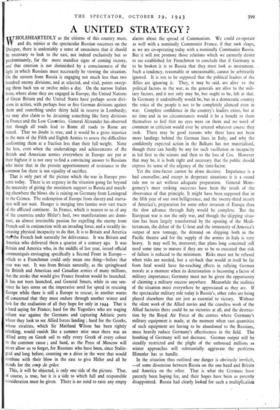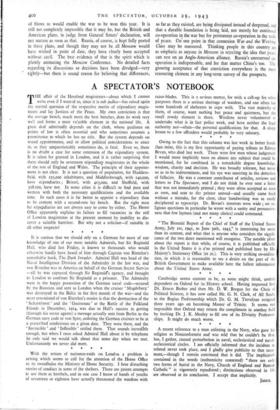A UNITED STRATEGY ?
WHOLEHEARTEDLY as the citizens of this country must, and do, rejoice at the spectacular Russian successes on the Dnieper, there is undeniably a sense of uneasiness that it should be necessary to look to the east, not indeed exclusively but so predominantly, for the more manifest signs of coming victory, and that emotion is not diminished by a consciousness of the light in which Russians must necessarily be viewing the situation. On the eastern front Russia is engaging not much less than two hundred enemy divisions, and at selected, and vital, points sweep- ing them back ten or twelve miles a day. On the narrow Italian front, where alone they are engaged in Europe, the United Nations of Great Britain and the United States have perhaps seven divi- sions in action, with perhaps four or five German divisions against them and something under thirty held in reserve in Lombardy; we may also claim to be detaining something like forty divisions in France and the Low Countries. General Alexander has observed that though all roads lead to Rome all roads to Rome are mined. That no doubt is true, and it would be a gross injustice to the men of the Fifth and Eighth Armies to assess the difficulties confronting them at a fraction less than their full weight. None the less, even when the undertakings and achievements of the British and American armies everywhere in Europe are put at their highest it is not easy to find a convincing answer to Russians who insist that in the present apportionment of resistance to the common foe there is not equality of sacrifice.
That is only part of the picture which the war in Europe pre- sents today. There is an urgency in the situation going far beyond the necessity of giving the maximum support to Russia and match- ing elsewhere the blows she is raining on Germany from Leningrad to the Crimea. The redemption of Europe from slavery and starva- tion will not wait. Hunger is merging into famine over vast tracts of the afflicted continent. In France, which is nearest to us of any of the countries under Hitler's heel, two manifestations are domi- nant, an almost irresistible passion for expelling the enemy from French soil in conjunction with an invading force, and a steadily in- creasing physical incapacity to do that. It is to Britain and America thaOthe French look naturally for deliverance. It was Britain and America who delivered them a quarter of a century ago. It was Britain and America who, in the middle of last year, issued official communiqués envisaging specifically a Second Front in Europe— which to a Frenchman could only mean one thing—before that year was out. It was from Britain naturally, as the springboard for British and American and Canadian armies of many millions, that the stroke that would give France freedom would be launched. It has not been launched, and General Smuts, while in one sen- tence he lays stress on the imperative need for speed in rescuing Europe while there is still a Europe to rescue, in another warns all concerned that they must endure through another winter and look for the realisation of all they hope for only in 1944. That is a hard saying for France; hard for the Yugoslays who are waging valiant war against the Germans and capturing Adriatic ports where they look to see Allied forces landing ; hard for the Greeks, whose rivalries, which Sir Maitland Wilson has been rightly rebuking, would vanish like a summer mist once there was an Allied army on Greek soil to rally every Greek of every colour to the common cause ; and hard, as the Press of Moscow will never allow us to forget, for Russians who have been, since Stalin- grad and long before, counting on a drive in the west that would combine with their blow in -the east to give Hitler Sand all he stands for the coup de grace.
This, it will be objected, is only one side of the picture. That, of course, is true, but it is a side to which full and responsible Consideration must be given. There is no need to raise any empty alarms about the spread of Communism. We could co-operate as well with a nominally Communist France, if that took shape, as we are co-operating today with a nominally Communist Russia. But it will not promote those relations which we earnestly desire to see established for Frenchmen to conclude that if Germany is to be broken it is to Russia that they must look as instrument. Such a.tendency, reasonable or unreasonable, cannot be arbitrarily ignored. It is not to be supposed that the political leaders of the Allies are ignoring it. They, it may be said, are alive to the political factors in the war, as the generals are alive to the mili- tary factors, and it not only may be, but ought to be, left at that. In Germany it undoubtedly would be, but in a democratic country the voice of the people is not to be completely silenced even in war. Complete confidence in the country's leaders exists, but at no time and in no circumstances would it be a benefit to them themselves to feel that no eyes were on them and no word of comment or criticism would ever be uttered whatever course they took. There may be good reasons why there have not been more landings behind the German lines in Italy, and why the confidently expected action in the Balkans has not materialised, though there can hardly be any for such vacillation or incapacity as led first to the seizure and then to the loss of Cos. However that may be, it is both right and necessary that the public should express its sense of the agency of the time-factor.
Yet the time-factor cannot be alone decisive. Impatience is a bad counsellor, and except in desperate situations it is a sound rule not to act without adequate preparation. General Mont- gomery's most striking successes have been the result of the observance of that principle. It might have been supposed that in the fifth year of our own belligerence, and the twenty-third month of America's, preparation for some other invasion of Europe than the slow advance through Italy would be complete. But the European war is not the only war, and though the shipping situa- tion has been largely transformed by the opening of the Medi- terranean, the defeat of the U-boat and the immensity of America's output of new tonnage, the demand on shipping both in the Pacific theatre and for the supply of the armies in Italy is very heavy. It may well be, moreover, that plans long concerted still need some time to mature if they are to be so executed that risk of failure is reduced to the minimum. Risks must not be refused when risks are needed, but a set-back that would in itself be far from fatal' would have far-reaching effects in rallying German morale at a moment when its deterioration is becoming a factor of military importance; Germany must not be given the opportunity of claiming a military success anywhere. Meanwhile the realities of the situation must everywhere be appreciated as they are. If the spectacular military role today is Russia's, other roles are being played elsewhere that are just as essential to victory. Without the silent work of the Allied navies and the ceaseless work of the Allied factories there could be no victories at all, and the destruc- tion by the Royal Air Force of the centres where Germany's military equipment is made, at the moment when vast quantities of such equipment are having to be abandoned to the Russians, must heavily reduce Germany's effectiveness in the field. The bombing of Germany will not decrease. German output will be steadily restricted and the plight of the unhoused millions as winter approaches will substantially aggravate the problems Himmler has to handle.
In the situation thus outlined one danger is obviously implicit, —of some dissension between Russia on the one hand and Britain and America on the other. That is what the Germans have patently been hoping for, and their hopes have been as patently disappointed. Russia had clearly looked for such a multiplication of blows as would enable the war to be won this year. It is still not completely impossible that it may be, but the British and American plans, to judge from General Smuts' declaration, will not mature as soon as thai. Russia, of course, is kept fully posted in those plans, and though they may not be all Moscow would have wished in point of date, they have clearly been accepted without cavil. The best evidence of that is the spirit which is plainly animating the Moscow Conference. No detailed facts regarding its discussions or decisions have been divulged—very rightly—but there is sound reason for believing that differences, so far as they existed, are being dissipated instead of deepened, and that a durable foundation is being laid, not merely for continued co-operation in the war but for permanent co-operation in the tasks of peace. On one point in that connexion War and the Working Class may be reassured. Thinking people in this country are as emphatic as anyone in Moscow in rejecting the idea that peace can rest on an Anglo-American alliance. Russia's unreserved co- operation is indispensable, and for that matter China's too. The growing acceptance of that conviction everywhere is the most reassuring element in any long-term survey of the prospects.



























 Previous page
Previous page